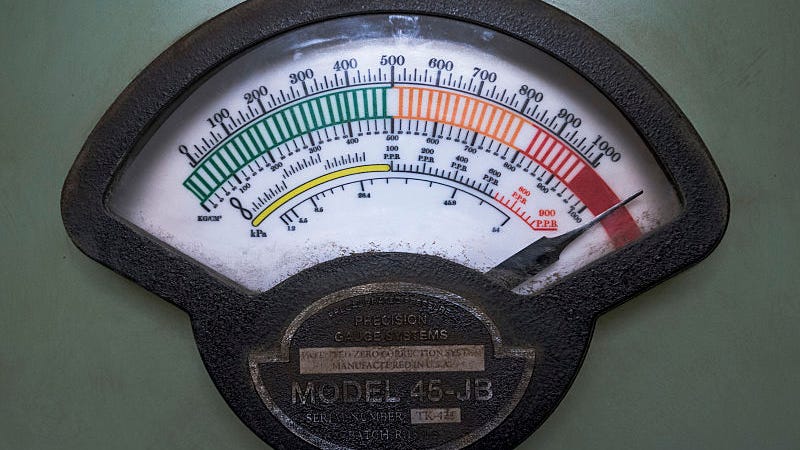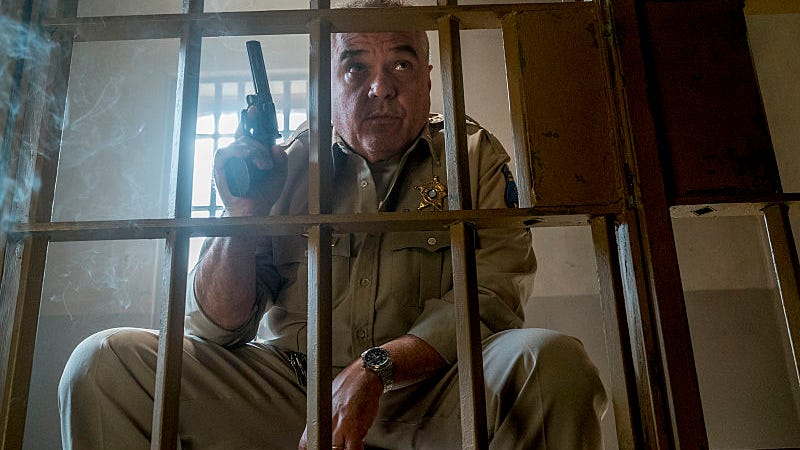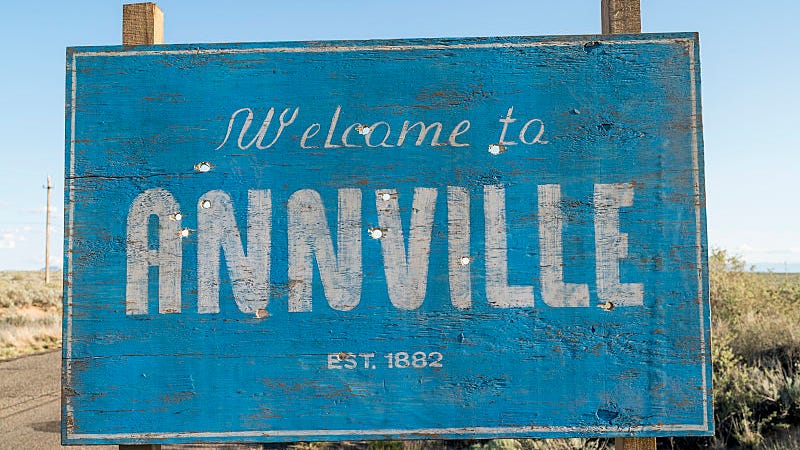Join or Sign In
Sign in to customize your TV listings
By joining TV Guide, you agree to our Terms of Use and acknowledge the data practices in our Privacy Policy.
Preacher: God Comes to Annville... Sort Of
The season came to an explosive ending!
Although Preacher's first season hasn't always been consistent, it's always been audacious. Few shows in recent memory have taken as many wild, big swings in their first season. The crazy turns, the stylistic flourishes, the darkly funny set pieces -- they've all covered up the occasional dead moment or stalled character development. But in this season finale, Preacher delivered a huge, bonkers moment that also felt especially earned.
This is an insane thing to say about a sequence in which almost everyone in Annville either killed themselves or was bombed into oblivion.
That's right, by the end of "Call and Response," the entire town of Annville had been destroyed -- first by a soul-crushing, epistemologically destructive encounter with "God" and second by a methane gas explosion at Quincannon's horrid factory meat farm. As far as we know, the only remaining characters are Jesse, Tulip, Cassidy, The Cowboy, DeBlanc, and Fiore. All the normies in Annville -- Odin, Emily, Hugo, the squabbling mascots, Tricia, the girl Eugene tried to kill, Tricia's mom, Donnie -- are gone, or will be soon.
Somehow, Preacher went to such dysfunctional, sacrilegious places before the town-destroying explosion that a flaming methane death seemed like a nice respite from real life for many of the show's secondary and tertiary characters. That's of course because Jesse's plan to Skype with God, live in the middle of Sunday service, actually worked. After a few initial connectivity issues -- you always have to test these things once before the real performance, what an amateur move, Custer -- the much-maligned Preacher brought The Alpha and the Omega to his congregation.
It did not go well.
While this figure had all the proper signifiers of His Holiness -- glorious white beard, booming voice, bright golden light, etc. -- and easily convinced the Annville natives of his bona fides, Jesse wasn't convinced. God didn't seem to know a thing about Genesis, the energy source that has nearly gotten the good preacher murdered time and again this season. And so, in the middle of the best moment in everyone else's life, Jesse Custer, fully fed up with how God has ruined his life and caused some of his most traumatic moments, called God on his B.S.
That also did not go well.

Jesse was right. Despite the theatrics and the display of legitimate heavenly power, this was not God -- just a really good cosplayer. God is missing. Heaven can't find him. Things are very bad up there. And almost immediately, things turned very bad down here as well.
There's a tendency to assume that any story that features trouble in heaven or a personified God is only attacking everything heaven and God seem to represent in the lives of billions. Preacher definitely views religion and belief with a critical eye, to the point where you could read this entire sequence as a sharp takedown of those things -- "this is what your faith gets you," for example. If that's your take on Preacher, this fake carny God was another way for the show to poke fun about organized religion and everything that comes with it.
But there's more going on here. This season has illustrated that the people of Annville have very little of basically everything -- jobs, healthy food options, life prospects, the whole deal. The regular folks the show has asked us to follow have all seemed unfulfilled at best, demonstrably sad at worst. They're desperate for community, that's why they attended Odin's assault on Jesse in the church a few weeks back. It was something to do. They're equally desperate to believe that there's some organizing force making all their discomfort and sadness worth it, and they keep coming to church.
Imagine being in that room, where God seemingly reveals himself and declares that you'll be saved. The suffering was not in vain and everything will be alright in the end. And then imagine having that all ripped away when it's revealed that God went for a pack of smokes and never came back. Does salvation even mean anything to you at that point? Does anything mean anything?

So yeah, the subsequent response of Annville's citizenry made for a tremendously bleak picture, even for Preacher. The mascots hanged themselves together. Tricia's mom ended her catatonic daughter's misery with a pillow. The church was ripped down and the last vestiges of a small, broken town crumbled to pieces. Nihilism and fatalism took over -- just in time for Quincannon's methane energy source to backfire, engulfing the entire town in the process.
In an episode where the show's core trio -- a group made up of non-believers -- basically escaped the carnage in Annville unscathed, reenergized, and on the hunt for that giant absentee dad in the sky, it's clear that Preacher is moving onto something new, and it doesn't require that dead-end town or its inhabitants. The penultimate scene, with Jesse, Tulip and Cassidy at the diner, purposefully evoked the early panels of the comic, signaling that the show is ready to tell a much bigger, scattered story. Hunting God, with The Cowboy on their heels, is sure to be very cool.
That story is what makes up a big chunk of Preacher's comic run. If you're a book reader, or someone just really intrigued to see how the show can open up this world, Season 1's extended stay in Annville, with all these miserable and unimportant characters, might have been a little frustrating. Watching them commit suicide or blow up was a tying off of those loose ends, in the most brutal fashion Sam Catlin and company could think of.

While I felt that way at times in Season 1, the hideous end for Annville and its residents was ultimately necessary for Preacher as a TV show. Not only did the show probably need to establish where Jesse came from, but also give him a real reason to hunt down God in the first place. Genesis does some of that work, but a season's worth of stories in Annville, with Jesse repeatedly trying to help these people in his own selfish and misguided ways, is a more successful catalyst to get Jesse out in the world. He thought he had unfinished business in his hometown, but couldn't help in the proper ways. So it's time to find the "real" root of the problem.
Annville's dark turn further solidifies what really is at stake here. Jesse, Tulip, and Cassidy won't only be avenging the locals when they seek out God. But that all of these sad, mostly normal folks died after such a traumatic experience means that something upstairs has to change. As if Jesse needed anything else about which to feel guilty!
No matter how you feel about what happened in Annville, or how Preacher moves forward in the aftermath, you cannot deny the show's chutzpah. This first season was full of good performances -- Dominic Cooper was solid at the center, but Ruth Negga and Joseph Gilgun get to have so much more fun -- and one technically novel sequence after another. But it's the way that Preacher kept trying to go bigger each week, or in even in the next scene, that made it infectiously watchable, and one of the year's best new shows.